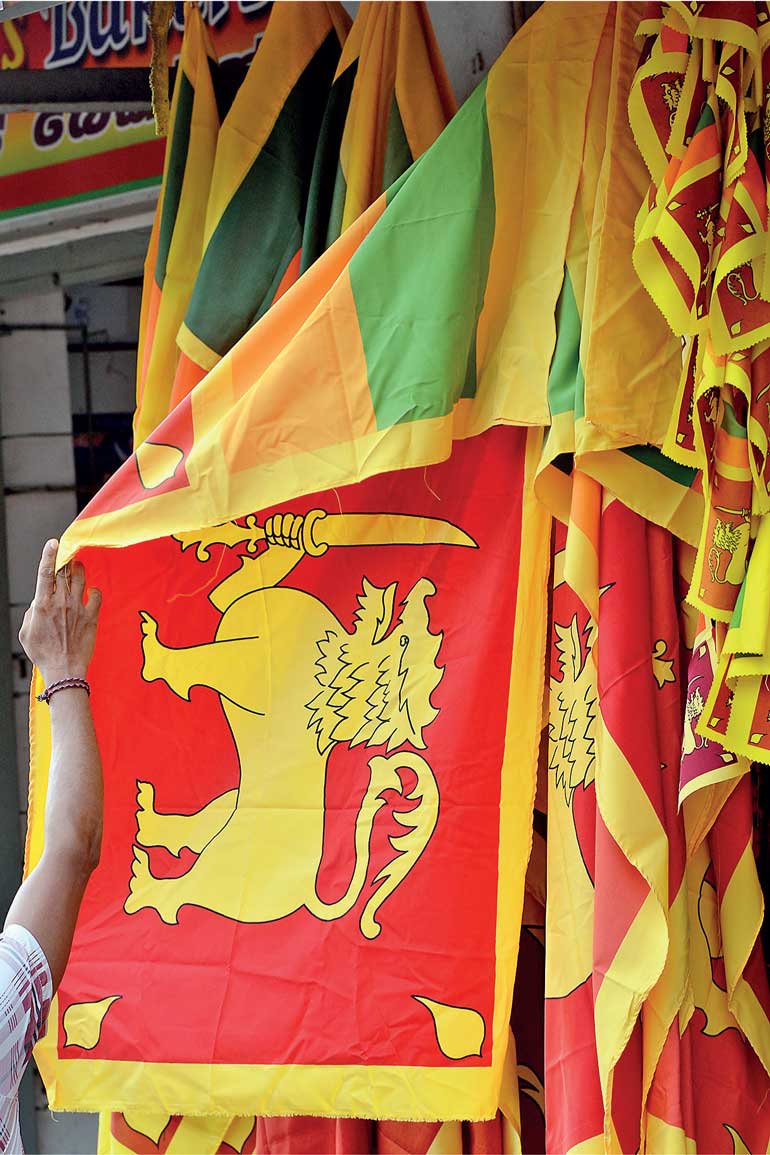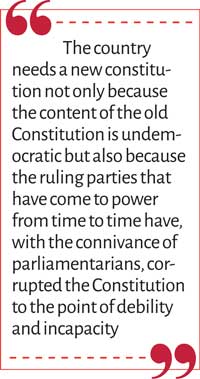Saturday Feb 14, 2026
Saturday Feb 14, 2026
Friday, 5 November 2021 00:00 - - {{hitsCtrl.values.hits}}

Integration of the divided nation and building of the Sri Lankan nation within a framework that guarantees the identity, human dignity and rights of all racial, religious, gender and cultural groups should be a prime objective of the proposed new constitution – Pic by Shehan Gunasekara
|
 1. The issue of fielding a suitable candidate for the next Presidential Election in 2025 to defeat Gotabaya Rajapaksa, the incumbent President, can be said to be the most popular topic of discussion
1. The issue of fielding a suitable candidate for the next Presidential Election in 2025 to defeat Gotabaya Rajapaksa, the incumbent President, can be said to be the most popular topic of discussion
among the top circles in the political arena, today.
2. This possibly reflects the superficial character of the political thinking in Sri Lanka.
3. Sri Lanka does not require a recurrence of 2015. Though it was possible to defeat President Mahinda Rajapaksa temporarily, by fielding a surrogate leader on ad-hoc and unconventional basis, in the final analysis the devastation caused to the country was immense. It also shoved the UNP out into the ruins almost out of existence.
4. It is not prudent to believe that the prevailing political system of the country could be changed by winning a Presidential Election. The atmosphere of the Presidential Election has been set up in such a way that it can only be won by corrupt ways. Winning a Presidential Election involves a lot of money. It cost approximately Rs. 3 billion in 2015. At present, it may amount to Rs. 4 to 5 billion. Invariably, the candidate will be compelled to become a prisoner in the custody of several black money launderers to procure such a large amount of money. On the other hand, what will happen if the successful candidate gets tempted to savour the power of presidency after the victory?
5. The socio political system of Sri Lanka is no longer in a healthy state, but in a state of decay and disintegration. It is unlikely that the country will remain calm without major events until the next Presidential Election. Probably many unfavourable things might happen in the interim and the system might collapse even before the next Presidential Election. If so, the dream of seizing the presidency and changing the system thereafter will turn out to be a phenomenon of mental aberration.
6. Do not attempt things that will reinforce the present political system which is destined to collapse. Instead, what needs to be done would be to stalemate the corrupt political system that has decayed and degenerated to the maximum, and launch a program to win a reasonable space for reform and recreate a modern, better and more efficient political system that would eventually pave the way for the beneficiary change of the country.
7. According to the Constitution, sovereignty rests on the people. The Constitution clearly states that it is an inalienable power. The State derives its sovereignty from the people which means the people are the fountain of power of the State.
8. According to the Constitution of Sri Lanka and International Law, the people possess the primary right to legislate the Constitution of the country.
9. The interpretation given by the textual authority of the Human Rights Commission on Article 25 of the International Covenant on the Civil and Political Rights of the United Nations which reads as “the right of the people to participate in public affairs" establishes the right of the people to take part in the running of the public affairs of his/her country, which implies that whenever the citizens feel that their constitution should be changed, they can directly involve in it under the definition – the running of the public affairs.
10. At present adopting a new constitution for Sri Lanka is indispensable as the present Constitution has lost its legitimacy and efficacy due to its persistent corruption by successive rulers.
11. The President had appointed a committee headed by Romesh de Silva to draft a new constitution. It is reported that the committee has drafted the constitution and submitted it to the President and the Cabinet. A few days ago, G.L .Peiris, Minister of External Affairs announced that it would be presented to Parliament in January next year. This reflects the repulsive and anti-democratic approach adopted in formulating a new constitution for the country
Cabinet. A few days ago, G.L .Peiris, Minister of External Affairs announced that it would be presented to Parliament in January next year. This reflects the repulsive and anti-democratic approach adopted in formulating a new constitution for the country
12. Attorney-at-Law Basil Fernando, the founder of the Asian Human Rights, Commission has described this as a spurious constitution designed to be adopted without sincerity. This program of making a new constitution is contrary to the vision of the existing Constitution as well as International Law.
13. The potential damage to the country would be enormous if a policy of standing aloof is adopted in the face of the enactment of this spurious constitution.
14. Neither the Government nor the Parliament in general can have the legal or moral right to draft a new constitution without the active involvement of the people in its process. The country needs a new constitution not only because the content of the old Constitution is undemocratic but also because the ruling parties that have come to power from time to time have, with the connivance of parliamentarians, corrupted the Constitution to the point of debility and incapacity. The breakdown, degeneration, failure and bankruptcy of the socio-political system and economy of Sri Lanka can be seen as the ultimate result of the combined effects of irresponsible, corrupt, predatory and arbitrary actions of everyone.
15. What right do they have to assume the role of the saviours of Sri Lanka, if it was they who had plunged the country into a deep abyss? The incumbent government has earned a profound public displeasure by now despite it being brought to power with a huge mandate. The oppressive and destructive rule of the Government can be said to have caused this situation. The Government has reached the point of indecency of withdrawing the criminal cases which had been filed against some leaders of their party. How could a Government which has repealed the 19th Amendment and enacted the 20th Amendment granting the president arbitrary powers, contrary to the promises made, be trusted that it will bequeath a better democratic constitution for the people?
16. This spurious program of constitution making planned by the Government must be defeated. At the same time, there is an urgent need to win a people-centred program to make a new constitution which will help build the nation and recreate the State so that the country and its people could be rescued from the depths of misery.
17. If this "spurious constitution" is allowed to be adopted it will certainly make the degradation, failure and misery befallen on Sri Lanka a serious matter impossible to be changed or rectified.
18. What Sri Lanka needs is not a constitution made by a dictatorial regime or a dictator, but one that ensures democracy and the rule of law.
19. Integration of the divided nation and building of the Sri Lankan nation within a framework that guarantees the identity, human dignity and rights of all racial, religious, gender and cultural groups should be a prime objective of the proposed new constitution. At the same time, it should aim at ridding Sri Lanka which is in a state of decay, failure and bankruptcy- of corruption, inefficiency, authoritarianism and sadism that is prevalent in the state administration and recreating a democratic state functioning on the rule of law which is conducive to promoting respect and dignity of all citizens.
20. The Government's attempt to legitimise a spurious constitution must be defeated, and at the same time, an attempt must be made to achieve a participatory constitution which includes the reforms needed to overcome the overall crisis.
21. In the legal and moral sense, the Government’s stance on the subject of making a new constitution is rather weak and not strong. The Government’s approach to the program of making a new constitution is contrary to the concept of the sovereignty of people enshrined in the Constitution of Sri Lanka and also the international law. If this position is utilised prudently and vehemently, perhaps it might be possible to exert pressure on the Government and win a suitable legal framework conducive to adopting a participatory constitution.
22. In addition to a campaign of public protest against the Government's move for adopting a spurious constitution, a strong case of public litigation too could be staged to give greater impetus to the former. Since this is an issue of the Constitution, the fundamental law of the country, it would be possible to set up a suitable framework that allows individuals and groups that are encountered with major problems or having grievances, to join the public litigation process as individual petitioners or a member of a group. For example, those who are faced with environmental issues could point out the devastation caused to the environment and appear for the need of formulating a constitution having a far-reaching vision and adequate provisions for the protection of the environment. Also those who are having grievances in the sense of ethnicity, religion or culture could point out the damages they have suffered and appear for the need of a constitution that will ensure justice for them. The farmers afflicted with the fertiliser problem and other issues can also appear for the need for a new constitution which will provide for the adoption of a national policy on agriculture that will enable the solution of their problems. The fisher folk too could do the same. The teachers can present their grievances and become partners in the case. Tamils and Muslims can appear for a visionary and disciplined system of governance to ensure dignity, security and justice for them. The victims of the Easter tragedy can also join the process and present their grievances. The Sinhala Buddhists can also highlight their grievances, and demand for a new constitution acceptable to them. Those who are interested in a system of good governance can indicate the flaws of the existing system, and demand for a new constitution pointing out the fundamental elements to be incorporated in it.
23. The proposed case of public litigation can be turned into a forceful and people-centred legal struggle calculated to win a reform program to bring about a positive and complete change in the system including the adoption of a participatory constitution aimed at overcoming the crisis facing Sri Lanka. If the local Judiciary denies justice in this case, an appeal should be made to the Human Rights Committee of the United Nations. International Law strongly recognises the right of the people of a failed state such as this to have a participatory constitution. Therefore, in the final analysis, public litigation of this nature would prove to be to the advantage of the people rather than the Government.